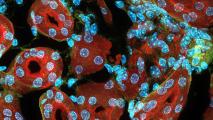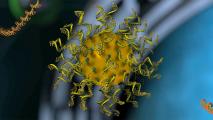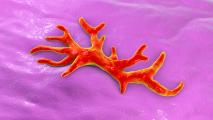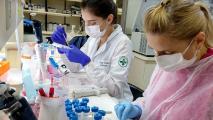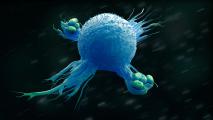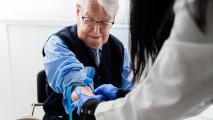
Biotech
Human history has been all but defined by death and disease, plague and pandemic. Advancements in 20th century medicine changed all of that. Now advancements in 21st century medicine promise to go even further. Could we bring about an end to disease? Reverse aging? Give hearing to the deaf and sight to the blind? The answer may be yes. And soon.
More
Experiment regenerates a damaged kidney for the first time ever
A new treatment that caused the diseased kidneys of mice to regenerate might one day do the same for people.
DMT therapy appears effective for depression in phase 2 clinical trial
London-based Small Pharma has released positive top-line results for their phase 2a trial of DMT as an antidepressant.
New CAR-T therapy shows promise against ovarian tumors
A CAR T-cell therapy that’s effective in mice with ovarian cancer may bring us closer to using the blood cancer treatment against tumors.
Scientists have discovered how to make almost any vaccine more potent
An approach called “rational vaccinology” could allow us to design more powerful vaccines, just by rearranging their ingredients.
“Brain-eating” amoeba beaten by old European drug
A man infected by a deadly brain-eating amoeba is on the road to recovery thanks to a decades-old drug used to treat urinary tract infections.
CRISPR eliminated heart damage in mice after a heart attack
A new CRISPR base editing therapy was able to prevent mice from suffering seemingly any heart damage following an induced heart attack.
New evidence that teeth can fill their own cavities
Researchers find that, in some cases, tooth dentin can be regrown instead of needing to be replaced with man-made composite.
“Bioprinted” skin could help end animal testing for cosmetics
Bioprinted skin can now look and act so much like real skin that it could one day replace some animal testing.
Mindfulness can slow down the brain’s aging and more
The benefits of practicing mindfulness carry over into everyday life – even when you aren’t actively meditating.
Yale researchers have found a way to spot new viruses
By screening negative nasal swabs for a specific antiviral protein, a Yale team believes we may be able to find hidden viruses before they emerge.
Human-rat brain hybrid shows a way to cure blindness
New research has shown that human “mini brains” can integrate with damaged rat brains to perform functions related to sight.
New “cyborg” cells could be the future of medicine
Semi-living “cyborg” cells might one day do everything from deliver cancer treatments to help clean up the environment.
First-of-its-kind nasal vaccine for COVID-19 deployed in India
India has begun deploying a nasal vaccine for COVID-19 that may be able to prevent infections, not just limit their severity.
ChatGPT-like AI creates new bacteria-killing proteins
Using a large language model AI, biotech startup Profluent has created new antimicrobial proteins.
Your microbiome is influenced by the people you hang out with
The human microbiome is largely influenced by our social interactions, according to the largest study to date of microbiome transmission.
mRNA could train our blood cells to stop chronic inflammation
A new study has identified the substance used by our white blood cells to reduce inflammation when it is no longer needed.
New blood test predicts Alzheimer’s 3.5 years in advance
A blood sample and machine learning helps predict whether people with mild cognitive impairment will soon develop Alzheimer’s.
Why changing your mind is a feature of evolution, not a bug
Reasoning by yourself is a much weaker tool than contributing your reasoning to a group and being flexible to changing your mind.
The most undervalued problem-solving tool? Lateral thinking.
Lateral thinking is a way of approaching problems. It deliberately forgoes obvious approaches in favor of oblique or unexpected ones.
Get inspired with the most innovative stories shaping the world around us.













